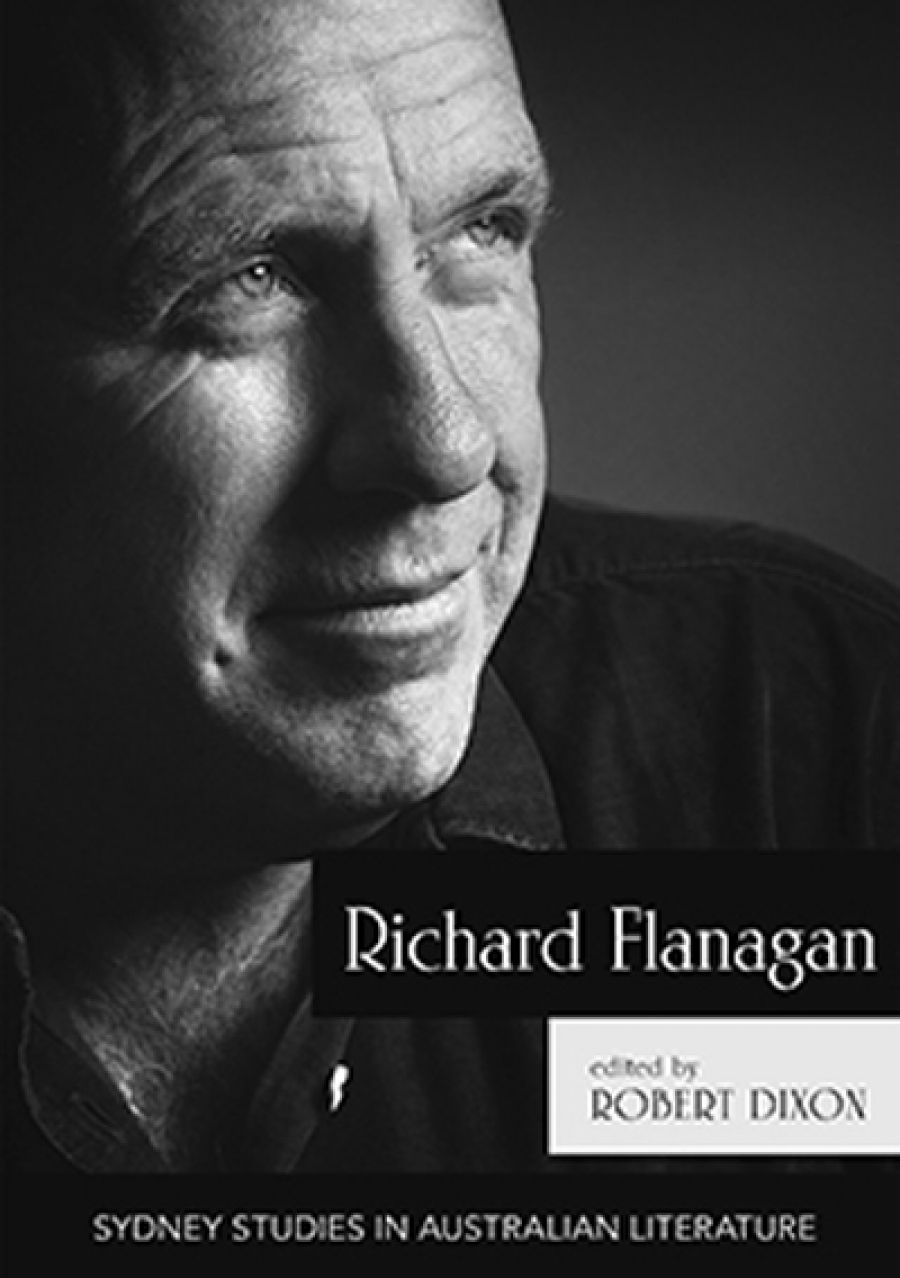
- Free Article: No
- Contents Category: Essay Collection
- Custom Article Title: Susan Lever reviews 'Richard Flanagan: New critical essays' edited by Robert Dixon
- Review Article: Yes
- Online Only: No
- Custom Highlight Text:
With The Narrow Road to the Deep North (2013), Richard Flanagan became Australia’s third winner of the prestigious Man Booker Prize for Fiction, leading many people to pick up his novels for the first time and to look for some critical support in reading them ...
- Book 1 Title: Richard Flanagan
- Book 1 Subtitle: New critical essays
- Book 1 Biblio: Sydney University Press $40 pb, 219 pp, 9781743325827
Despite his relatively recent international fame, Flanagan has been publishing novels since Death of a River Guide in 1994, after beginning his writing career as an historian with a book on the unemployed in Britain before World War II, and a history of the Gordon River area of Tasmania. Although Flanagan often presents himself as a rough-around-the-edges country boy self-taught in literature, he attended Oxford University on a Rhodes Scholarship in the mid-1980s, and the contributors to Richard Flanagan: New critical essays give him the intellectual respect this deserves.
With Liliana Zavaglia, Robert Dixon writes a long introduction to the book, summarising Flanagan’s career and the main arguments of the essays that follow, at times with greater clarity than the essays themselves. It may prove to be the most consulted part of the book, particularly acute on the writer’s shift from history to fiction. Dixon then elaborates this shift in an erudite essay canvassing the influence of Walter Benjamin and Hannah Arendt on Flanagan’s resistance to the idea of history as a progressive causal narrative, and his conviction that such narratives shore up the power of nations and empires. Flanagan chose to write fiction as a way to question and subvert the linear narratives of history, and Dixon provides the philosophical context for the novelist’s wayward and divergent mode of historical fiction. His essay is a model of thoroughly researched context, intellectual and philosophical engagement, and respect for the writer, expressed in clear and cogent writing.
The essays by Bill Ashcroft, Margaret Harris, and Zavaglia take up this idea of the fictional subversion of history, applied in detail by Ashcroft on Gould’s Book of Fish (2001), Harris on Wanting (2008), and Zavaglia on The Narrow Road. Marc Delrez follows a similar line examining the realignment of biography over several novels’ depiction of both real and fictional characters. There are two essays on the ‘outrider’ novel The Unknown Terrorist (2006), Flanagan’s one departure from Tasmanian subjects and reflections on the past, and Nicholas Birns gives attention to the ‘almost deliberately unliterary’ love story in The Narrow Road, arguing that love, not war, is the novel’s motivation. Other essays seek out particular aspects of the novels, such as their depiction of tourism as imperialism, their sound imagery, their ‘utilising’ of ‘magic realism’, or interest in human isolation and displacement. Salhia Ben-Messahel’s enthusiasm for philosopher Gilles Deleuze’s theory of the ‘radicant’ leads to a lot of ‘enrooting’ to explain a fairly simple idea about displaced identity. The trouble with schematic readings is that they tend to categorise the novelist as a schematic writer. Flanagan’s work can appear this way, even without these critical efforts, because, as the theories of history suggest, his politics are always obvious to the reader.
As I hold to the old view that there may be a difference between an author’s intentions and an author’s achievements, I find some of these essays too reliant on Flanagan’s many public statements about his work, and unwilling to explore the way the art of the novel might distort and change his ideas. Harris sounds a rare note of dissent when she asserts that Wanting’s ‘pervasive stress on the destructive force of desire is comprehensively over-determined’. Delrez also cautions that fiction is as prone to failure as history in representing the past, commenting that Flanagan’s bio-fiction ‘somehow forecloses the very avenue of investigation which the reader is invited to imagine’.
 Richard Flanagan (photograph by Joel Saget)
Richard Flanagan (photograph by Joel Saget)
While the introduction claims the book offers ‘a snapshot of critical approaches to Flanagan’s work’, there is little room for disagreement here about the novels’ achievements as art. My own reservations about The Narrow Road are batted away, and Birns dismisses Michael Hofmann’s devastating review in the London Review of Books as ‘contumely’, seeming a little surprised that it was also perceptive in its recognition of the contradictions in the novel. Zavaglia pounces on Hofmann’s comment about the novel’s ‘exploded’ form to link it with Walter Benjamin’s image of the angel of history who looks backward to see not a chain of events but ‘one single catastrophe which keeps piling wreckage upon wreckage and hurls it in front of his feet’.
The Narrow Road had the artist Ben Quilty on ABC’s The Book Club going down on one knee to Flanagan, while only one other panellist demurred. Les Murray declared it to be pretentious and stupid, while Tony Abbott disagreed sufficiently to intervene in the 2014 Prime Minister’s Awards, though it seems naïve to think this was a result of his own enthusiastic reading of the book. Readers often have extreme responses to Flanagan’s novels, but academic critics, on the evidence of this book, are confident that he is the goods.


Comments powered by CComment